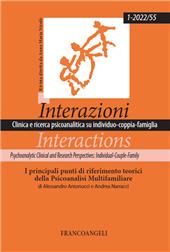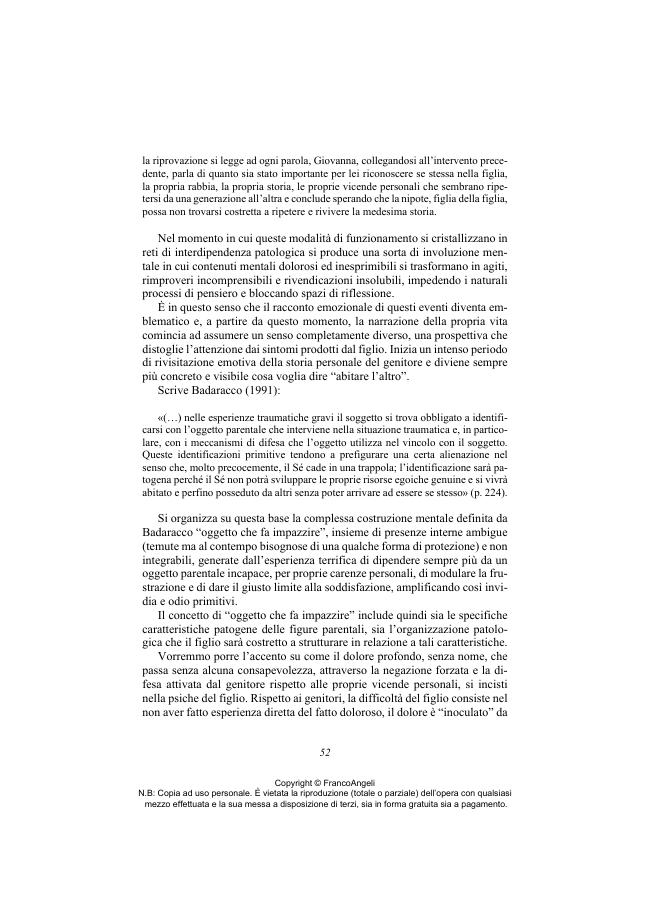La trasmissione transgenerazionale del dolore : espressione dell'abitare l'altro
47-57 p.
Gli autori mettono in evidenza come, nella pratica clinica del gruppo di Psicoanalisi Multifamiliare, l'emergere di ricordi traumatici e dei vissuti emotivi ad essi correlati consenta di percepire l'esistenza, nel mondo interno delle persone sofferenti, di "presenze" patogene, "presenze" che possiedono un potere di condizionamento permanente, segreto e occulto, molto difficile da cogliere in altri contesti. Intorno a tali "presenze" si strutturano identificazioni patogene che bloccano lo sviluppo di proprie risorse egoiche e il soggetto si vivrà abitato e posseduto da altri che gli impediscono di essere se stesso.
In questo lavoro si descrive come gli specifici funzionamenti del gruppo consentano di avviare processi di costruzione di identificazioni trasformative che riducano gradualmente il potere patogeno di tali presenze; i rispecchiamenti reciproci, il funzionamento del gruppo come "mente ampliada", l'emergere della virtualità sana personale sono gli elementi che consentono di potere iniziare a pensare, attraverso l'altro, ciò che risultava impossibile pensare da solo, in particolare rispetto alle proprie interdipendenze patogene. La presenza dell'altro diventa sostegno nella scoperta di Sé autentico e la costruzione di un'identità soggettiva integra. [Testo dell'editore].
The authors highlight how, in the clinical practice of the psychoanalytic multifamily group, the emergence of traumatic memories and related emotional experiences allows us to perceive the existence of pathogenic "presences" in the internal world of suffering people. Such "presences" possess a permanent, secret and occult power of conditioning, very hard to grasp in other contexts. Pathogenic identifications that block the development of their own egoic resources are structured around these "presences" and the subject will live inhabited and possessed by others who prevent him from being himself. This paper describes how the specific functioning of the group makes it possible to start processes for the construction of transformative identifications which are gradually able to reduce the pathogenic power of such presences.
Mutual mirroring, the functioning of the group as an "enlarged mind" and the emergence of healthy personal virtuality are the elements that allow the person to start thinking, through the other, what was impossible to think on his or her own. In particular with respect to his or her own pathogenic interdependencies. The presence of the other becomes of support in the disclosure of an authentic Self and in the construction of an integrous subjective identity. [Publisher's text].
Fa parte di
Interazioni : clinica e ricerca psicoanalitica su individuo-coppia-famiglia : 55, 1, 2022-
Articoli dello stesso fascicolo (disponibili singolarmente)
-
Informazioni
Codice DOI: 10.3280/INT2022-001007
ISSN: 2239-4389
MATERIE
PAROLE CHIAVE
- oggetto che fa impazzire, identificazioni patogene, interdipendenze patologiche e patogene, rispecchiamento reciproco, mente ampliata, virtualità sana
- maddening object, pathogenic identifications, pathological and pathogenic interdipendences, mutual mirroring, amplified mind, healthy virtuality



